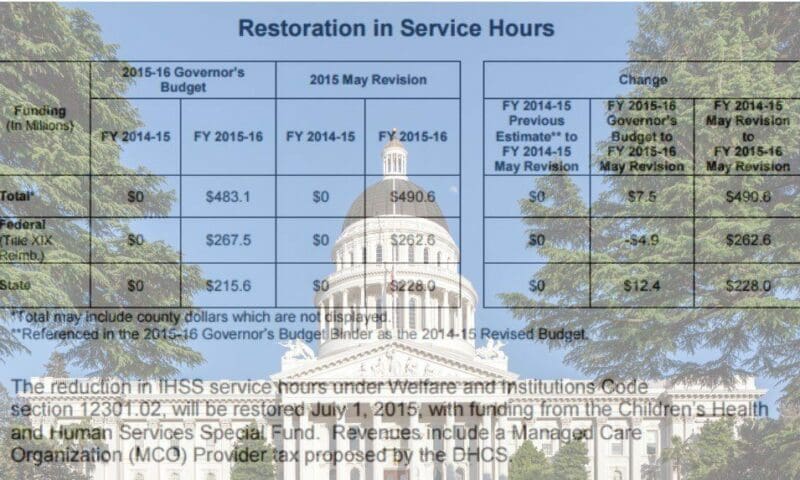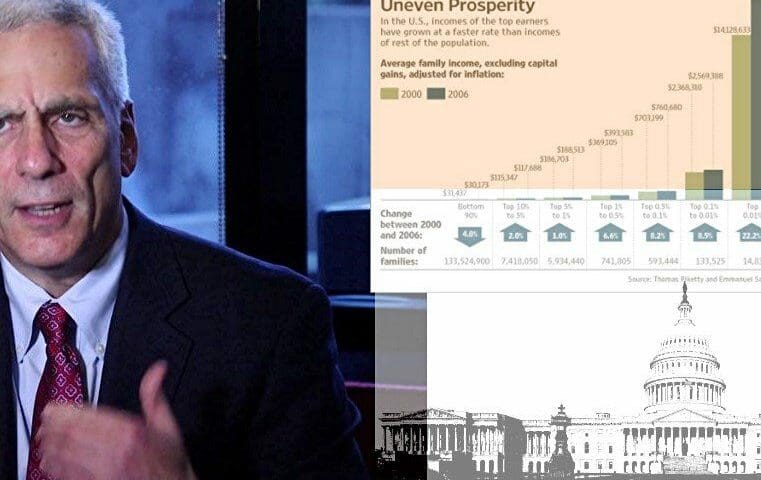

Los Angeles County Supervisor Mike Antonovich has hired a corporate-sponsored lobby group and PR firm to conduct a so-called “study” of the minimum wage.
Under Antonovich’s orders, the County is going to pay $55,000 to the Washington, D.C.-based Employment Policies Institute (EPI) to help him undermine a plan to create a countywide minimum wage that would reach $15 an hour by 2020, similar to the one recently passed by the City of Los Angeles. The policy would cover about a million employees in the unincorporated areas of the nation’s largest county.
Any one of the supervisors can authorize the county’s CEO to commission an analysis of a policy being considered without a vote from the other four members. That’s what Antonovich — who chairs the board meetings and prefers to be called the county’s “mayor” — did at the end of June.
Antonovich asked EPI to do extensive research on for-profit and nonprofit employers in the county’s unincorporated areas –
» Read more about: Meet Mike Antonovich's Minimum Wage Hitman »


Every year, every quarter, every month, the conventional economists either praise the increase in Gross Domestic Product (GDP) or anxiously wring their hands because the economy has not expanded enough. Expansion requires two key elements: a constant search for the lowest possible wages and an unending supply of raw materials – particularly fossil fuels, but also fertile soil and fresh water, and sometimes, creatures who live on the earth and in the seas.
While there are still places on the planet where people will take any job they can get, the ability to extract more energy resources gets riskier, and the environment’s capacity to absorb more waste is fast approaching zero. Reaching the outer limits of expansion threatens all of life on the planet. That reality is why many people are now calling for an “ecological civilization” as an alternative to more exploitation and extraction, one that offers another pathway for human civilization to take.


The nurses who showed up at state Senator Richard Pan’s Capitol office in May were furious. They had been assured by Pan, a Democrat from Sacramento, that he would be on their side when it came time to vote on Senate Bill 346, a charity care measure aimed at providing transparency to the state’s currently murky rules governing tax-exempt status for nonprofit hospitals.
But Pan, a physician who has risen to prominence this year as the sponsor of a mandatory school vaccination bill, abstained when the bill came up for a vote in the Senate’s health committee, effectively killing it when it fell one vote short of passing in that committee on April 29. The nurses alleged that the bill died because Pan withdrew his promised support after heavy, last-minute lobbying by the California Hospital Association (CHA). Pan’s spokesperson, Shannan Martinez, later issued a denial,
» Read more about: The Persuaders: California Hospital Association »


Here’s something you probably didn’t know happened in California in the last few years, and maybe it’s something you never imagined could happen: In 2011, two high-ranking state regulators were fired from their posts for pissing off the oil industry. No one really disputes the veracity of that statement; not even Governor Jerry Brown. “They were blocking oil exploration in Kern County,” the Sacramento Bee reported Brown announcing at an event six months later. “I fired them, and oil permits for drilling went up 18 percent.”
Catherine Reheis-Boyd, president of the Western States Petroleum Association, also celebrated without restraint, unconcerned that the people of California might detect her hand guiding the Governor’s pink-slip pen. After the firings, Reheis-Boyd boasted to the Los Angeles Times that her industry once again had a “clear pathway for people to get permits and proceed with drilling in this state.
» Read more about: The Persuaders: Western States Petroleum Association »


“Something always seems to be starting in California,” Angelo Amador, an attorney and vice president for the National Restaurant Association, told Bloomberg News.
It was 2012 and his remark was prompted by a California state Supreme Court decision favoring an employee’s right to have defined meal-break times. The association—dubbed “the other NRA” for its lobbying muscle, with annual revenues of $71 million in 2013–had vigorously opposed policy that required employers to ensure that workers take rest and meal breaks rather than leaving it to the employees to push back against managers to enforce break provisions.
Amador’s NRA is perhaps the largest trade group that you have never heard of, and supports an “institute” run by a PR firm that churns out opinions and papers to shape policy debates.
Also read these stories in our “Persuaders”
» Read more about: The Persuaders: California Restaurant Association »


Economist Jared Bernstein recently sat down with Capital & Main to offer his perspective on a wide range of political and income-inequality topics. Formerly a top advisor to Vice President Joe Biden and, currently, a senior fellow at the Center on Budget and Policy Priorities, Bernstein spoke to us again this week, following the U.S. Senate vote to fast-track the Trans-Pacific Partnership. The interview has been edited for brevity and clarity.
Capital & Main: What was your first, red carpet reaction to the Senate’s fast-tracking of TPP?
Jared Bernstein: I’m not that surprised but I’m not deeply disheartened or worried. What’s positive is that this time the text of the TPP will be in the public domain for two months before the ratification in Congress, and that will give lots of us a chance to take a closer look at it —
» Read more about: No Smiley Faces: Jared Bernstein on the TPP Juggernaut »


Tristain Frye’s success in life is important not just to her – it’s important to all of us.
Frye, who recently worked on a new building at Gonzaga University in Spokane, WA, did not have an easy road to becoming a carpenter’s apprentice.
When she was 22, she was sentenced to 12 years in state prison. At that point, the odds were solidly against her.
That is until Tristain was accepted into an innovative pre-apprenticeship program in partnership with the Ironworkers, Laborers and Carpenters unions called TRAC: Trades Related Apprenticeship Coaching at the Washington Corrections Center for Women. Read about her in my article on the AFL-CIO blog, Jobs, Not Prisons: Unions Help Formerly Incarcerated Women Build a New Life.
The 16-week program is open to women in the prison who can prove themselves physically able to do the demanding work required in the construction industry: carry heavy loads of rebar,
» Read more about: Reducing Prison Populations One Job at a Time »


In what is being billed by unions, environmentalists and human rights groups as an endorsement of an unprecedented expansion of corporate power and privilege, the Senate today passed a cloture vote on a motion to concur with a trade promotion authority (TPA) bill passed by the House.
Cloture effectively clears the way for Wednesday’s expected vote on fast track itself, which will only require a majority for passage and is needed to speed through passage of President Obama’s secretive and controversial Trans-Pacific Partnership (TPP) trade agreement without filibuster or amendment.
TPP has been widely criticized for effectively granting extraordinary legal rights to corporations and investors that it does not extend to unions, public interest groups and individuals.
Today’s cloture vote was 60-37, the barest minimum needed for passage. Thirteen so-called Corporate Democrat senators voted yes — including California’s Diane Feinstein — one less than lined up behind May’s 62-37 senate approval of a bill that had combined TPA and Trade Adjustment Assistance (TAA).


Clocking In is a new online tool from Race Forward, a New York-based group whose self-described goal “is to build awareness, solutions and leadership for racial justice.” Its analysis finds disturbing trends for people of color and women employed in the U.S. service industry. This virtual resource allows service employees to share their real-life job experiences with other workers, consumers, employers and policymakers 24/7.
90% of female tipped workers have experienced sexual harassment in the workplace.
Clocking In sends participants on a virtual journey while offering activist information on a range of workplace issues. Visitors choose one of three employment portals representing the restaurant, retail or domestic industries.
Clicking the restaurant option, for example, brings up a screen that says: “Workers in the restaurant industry face race and gender discrimination daily! Click ‘Start’ to learn from Race Forward and Restaurant Opportunities Centers United (ROC) about how it happens and what YOU can do about it!”
Next is a choice to click a male or female character.


The 467,000 Californians who receive assistance from the state’s In-Home Supportive Services are breathing a little better, if not easier, now that a new budget has restored care cuts to the agency. The program typically assists elderly, blind and disabled people on low incomes with housework, meal preparation, personal hygiene and other services; by paying individuals through the state to perform these tasks, the care recipients are able to remain in their homes and avoid being institutionalized – which also saves taxpayers millions of dollars.
Also Read: Will Sacramento Restore Home Care Cuts to Seniors & the Disabled?
A few years ago IHSS suffered a seven-percent funding cut that Governor Jerry Brown pledged in January to restore – but without providing a specific funding stream to do so. Brown suggested that revenue for the restoration could come from either a new tax on certain health care plans or from the state’s General Fund.
» Read more about: In-Home Care Recipients Cautiously Applaud New Budget »
Several years ago I produced a documentary film about young men who had been in gangs and in prison, men who had had their lives turned around when they were accepted into building trades unions. They all came from tough and economically deprived backgrounds. In addition to their social environments, what was similar about all of the young men who had gotten in serious trouble was the absence of a father in their lives.
Most of them explained to me that while they respected their mothers’ feelings while in the home, when outside of the house they gravitated towards other male figures. Arturo Peña, who was part of a gang in Los Angeles’ Ramona Gardens housing project, reflected on his experience as a young man. “We didn’t have fathers growing up so we looked up to these older gang members who dominated and controlled the streets.”
The lucky ones from so-called “broken families” —
» Read more about: Fathers and Sons and Daughters: Father’s Day at the Wilshire Grand »


Former Governor Arnold Schwarzenegger once termed it the “stuff [I] used to blow up in the movies.” But America’s vital infrastructure—highways, railways, bridges and thruways—now face a doom worse than the Terminator ever imagined. That’s the destruction from the rust, decay and corrosion of trillions of dollars worth of elderly tracks, canals, ports, structures and causeways that carry our trade and traffic all over the United States.
Sixty-one thousand bridges, located mostly in local jurisdictions, are potentially dangerous. That U.S. rail systems are about $60 billion behind on maintenance (as of five years ago) was tragically illustrated by the recent fatal Pennsylvania Amtrak disaster, blamed on the delayed installation of a new control system. Last month’s burst oil pipeline in Santa Barbara County also underscored the deterioration of even private infrastructure. Both tragedies demonstrated that continued neglect comes with a fast rising cost in both money and lives. For more than a decade,


When Jared Bernstein recently sat down with Capital & Main, he had just been chosen as chair of the National Employment Law Project’s board of directors, while continuing his roles as a senior fellow at the Center on Budget and Policy Priorities, and as a frequent commentator on MSNBC and CNBC. Picked in 2009 by Joe Biden to be the Vice President’s top economic advisor, Bernstein had already distinguished himself as a passionate critic of inequality during his long tenure at the Economic Policy Institute, one of the country’s leading think tanks. His views on economic issues were well to the left of Obama’s and the rest of the President’s team, ensuring that progressive ideas would get a hearing inside the White House as the administration wrestled with the worst downturn since the Great Depression.
While Obama and his advisors succeeded in reversing the Great Recession’s massive job losses and saving the bacon of the financial industry,
» Read more about: Watch Now: Jared Bernstein on Inequality & Lip-Syncing Republicans »


In what was widely seen as a stunning rebuke to President Obama’s efforts to speed through congressional approval of the administration’s Trans-Pacific Partnership (TPP) free trade agreement, the House of Representatives last Friday rejected a key measure needed to “fast track” the controversial pact.
The defeat came in a vote on one of two related bills that both needed to pass for Fast Track to move forward — a reauthorization of Trade Adjustment Assistance (TAA) funds, a program that pays for job retraining for those thrown out of work because of free trade deals like TPP.
House Republicans have vowed to get another floor vote on TAA as soon as early this week to allow the White House a second chance at fast track.
The reauthorization failed by a lopsided 126-302 — a margin attributed to the efforts of a broad coalition of labor unions,
» Read more about: The Trade Agreement California Dodged – For Now »


The problems are well documented. Northrop Grumman botched the upgrade to New York City’s 911 systems while billing the city $300,000 to $430,000 annually for each of their 137 consultants. A $132 million dollar contract to upgrade phones and Internet services for municipal agencies in Orange County, California is already $13 million over budget while municipal employees report repeated outages and failed solutions from the contractor, Xerox. And who can forget all those failed Obamacare exchange websites brought to us by mega-information technology contractors such as CGI and Oracle?
For too long, local and state governments have turned over control of their critical digital infrastructure to companies claiming they could do the work cheaper and faster than public employees. But after the last few years of failures, cost overruns, and plain old shoddy work, local leaders are finally realizing that in this digital age,
» Read more about: Insourcing Taxpayer Savings and Efficiency »


It’s no secret that former U.S. Labor Secretary Robert Reich has some misgivings about the direction of the American economy. But the prolific writer, radio commentator and longtime University of California, Berkeley professor isn’t thrilled about how we are educating our kids, either.
As part of a new project with the activist group MoveOn.org, Reich recently released a video that described our education system as “squashing passion for learning, eroding the love of teaching and grinding up generations of young people.” The critique is accompanied by a set of proposals to reinvent American education – one of 10 planks in a broader agenda titled “10 Ideas to Save the Economy.”
Reich has addressed the nation’s education challenges in his books, including 2011’s Aftershock: The Next Economy and America’s Future, as well as in his 2013 film Inequality for All (available on NetFlix,


A recent L.A. Times story profiled a fast-food worker who, according to reporter Don Lee, would lose eligibility for Medicaid if his wages were raised to $15. His wage gains could be “wiped out” by the higher health care costs he’d end up paying. Lee’s portrayal was inaccurate and misleading.
The story centers on 53-year-old Douglas Hunter, a Chicago McDonald’s cook and a leader in the Fight for $15, a national movement of fast-food workers who are pushing for $15 in hourly wages and the right to form a union without employer retaliation.
Hunter is currently enrolled in CountyCare, a Medicaid-managed care plan that pays for his health care, including more than $700 per month in medications and supplies he needs to manage his diabetes, cholesterol and blood pressure. Contrary to Lee’s assertion, Hunter would still qualify for Medicaid based on his income if his wage were raised to $15.
» Read more about: L.A. Times Calls Out Fight for $15 Guy, Gets It All Wrong »


The newest front in the battle over the retirement security of California’s public employees opened June 4 with the release of the language for a proposed ballot initiative that would rewrite the state’s constitution to virtually outlaw traditional defined-benefit pension plans for future state and municipal workers.
The measure, dubbed “The Voter Empowerment Act of 2016,” would effectively shift all new public employees from the various defined-benefit plans currently in place to 401(k) plans, beginning in 2019. It would then lock those plans in place by adding the burden of direct voter approval on government employers who want to continue offering traditional pensions after 2019.
Also see in this series:
The security offered by defined-benefit retirement plans has been typically used by government employers to compete with the private sector in recruiting quality candidates for public workforces.
» Read more about: New Retirement Ballot Proposal: The Language of Cuts »


No city offers Californians a better example of voter-approved pension-cutting than San Jose. In 2012, then-mayor Chuck Reed, who is the co-author of the new “Voter Empowerment Act of 2016,” persuaded citizens to pass Measure B. Some provisions of the San Jose law were later thrown out by a Santa Clara County Superior Court, but an uneasy atmosphere lingers over this city whose public employees were vilified by Measure B’s supporters. Capital & Main recently discussed the fallout from Measure B and previous budget cuts, with a city firefighter who requested that only his first name be used.
Capital & Main: What do you see as the biggest problem facing the San Jose Fire Department today?
Matt: Don’t get me wrong, I love the department I work for . . . Unfortunately with the budget cuts that our department [has] faced [for] over a decade,
» Read more about: San Jose's Pension-Cutting Legacy: A Firefighter's Story »


On April 10, the libertarian Reason Foundation held its strategic “pension summit” in Sacramento’s Sterling Hotel to reduce government workers’ retirements. A proposed 2016 state ballot measure to cut public employee pensions by shifting them from traditional, defined-benefit pensions to more volatile 401(k)-type retirements took center stage. At that point, the measure was months away from being submitted to the state Attorney General’s office for a title and approval of its wording.
The measure is co-authored by Chuck Reed, the former Democratic mayor of San Jose who successfully pushed a 2012 city pension-cutting ballot initiative, Measure B. Reed headlined the summit, which was open to the media only on an off-the-record basis.
“The political support is the relatively easy part,” Reed told Capital & Main after the summit concluded. “As long as you are solving a problem the public is willing to support it in the form of pension reform.”
But not everyone shares Reed’s optimism.
» Read more about: In Their Own Words: Pension Disrupters Speak »